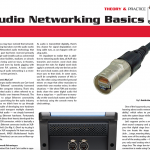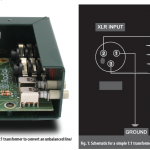Yes, it is time to get back up on the soapbox and address the critics — in this case, the critics of FOH magazine and, especially, yours truly. From time-to-time we receive comments that FOH is not technical enough and doesn’t expose the readers to rigorous acoustical theories. Now I am all for rigorous acoustical theory, but I am in the upper five percentile of readers who actually understand what is being said and the incremental benefits of the theory being proffered. So I think I will leave those kinds of physics papers for the Audio Engineering Society (AES) transcripts and those other magazines that need to publish high-brow treatises to show editorial gravitas. BTW, our last reader survey found that just 10% of readers found FOH “not technical enough,” and nearly half that number said it was “too technical,” The majority (86%) placed us in the “just right” range.
Book Smart
Having said all that, there is nothing wrong with devouring all the audio industry information you can. I have no problem with audio technicians and engineers taking university acoustics courses or attending Syn-Aud-Con seminars. And believe me, I have a lot of bookshelf space dedicated to books on audio topics, including both Audio Cyclopedias, the Yamaha Handbook and tons of tomes related to audio engineering. Of course, I am showing my age as I have an ancient copy of the Radiotron Designer’s Handbook due to my fascination with all things vacuum tube. I am probably the only person in my county with a working tube tester and tube caddy carrying case, and who can fix your old 1950s Bogen public address amplifier in a jiffy.
However, being book smart only gets you half way to being competent. You gotta get out to the gigs and either assist or lead on the setup, performance and tear-down of the shows. Starting out, you may be working with garage bands, helping them muddle through their first public performances to gain experience. And you might be working with gear not entirely designed for live sound performance. Nevertheless, get out there and do some networking with other production people and performers, and you will get exposure to better gigs and gear.
Physicists vs. Engineers
My mind often wanders to the classic comedy movie, Animal House, in which John Belushi as Bluto, the gross impulsive frat boy, is both physicist and engineer. In one memorable scene, he precisely measures a fellow frat mate’s brother’s car windshield and then smashes the windshield to bits with a mallet. Like the precise Bluto, physicists (acousticians) measure accurately the room (or transducer characteristics), but it’s the engineers who, like the windshield-smashing Bluto, put all this theory into common practice.
On one hand, we can agree that if you have a concert hall performance in the evening with all day to load in and tweak the sound system, it can be expected that the staff system engineer will have a handle on the venue acoustics, speaker coverage and speaker placement to provide most patrons with good sound. After all, there are serious sums of ticket money at stake to ensure a worthy show.
On the other hand, there are local and regional soundco guys like me who have street dance productions in small towns — where the street is closed off at 6:00 p.m., the show starts at 8:00 p.m. and some rickety version of a performance stage is provided with a street lamp power panel in a dubious state of usability. The good news is that the acoustics are just as good as the weather, road pavement and the expected crowds. An acoustician would not be very useful here, and might even be a detriment to time management for the outdoor street dance. In contrast, the local soundco owner might make an adequate stagehand for an indoor big-act concert, but would likely be experience-shy at trimming up the rigging and speaker processors in the larger venue.
The moral of this physicist versus engineer debate is: Learn the acoustician’s concerns, but keep them in perspective, as you still need to get the show done. Also, although you don’t need acoustic analysis tools at a street dance, they certainly are handy when tuning up the rig at the shop and for the big shows.
The Speed of Methane
Often readers lambaste me because, when quoting the speed of sound, I round down to 1,100 feet-per-second. In my defense, I figure that two sig-nificant digits of precision is a good start for engineering work, and I can always work acoustical time delays because temperature and humidity affect the actual speed of sound. Most audio system engineers know this and will shorten up the delays on the speaker processing to delay the speakers until the crowd fills the indoor venue, bringing up the temperature and humidity. The engineer then tweaks the delay until the delay speakers allow most of the patrons to sense that the sound is coming off the stage and not out of the delay speaker stacks. The physicist, however, will ask for accurate temperature and humidity numbers and calculate the delays via the speed-of-sound equations. Great for install system work, but likely a bit anal for concert system engineers.
Getting to the numbers: My critics say that 1,147 feet per second is the golden hallowed number that must always be used, because it was what they measured on a hot Iowa summer day in a college field house in high humidity. The engineer in me immediately pulls open my Radio Engineer’s Handbook and recites, “1,086.9 feet-per-second at zero degrees Celsius and zero humidity.” So who is right? The answer: 1,147 feet-per-second is more correct for indoor events in summer, and 1,086.9 feet-per-second is better for an outdoor concert in a Minnesota January. But I maintain that 1,147 is not the right number all the time, and that 1,100 feet-per-second is close enough for this engineer. However, I did notice in my handbook that methane is about 1,147 feet-per-second in sound velocity (at 0ºC and 0% humidity), so I figure that Mr. “1,147ft/sec always” is full of methane and can be ignored.
The Take-Home Message
As chief editor Bill Evans eloquently put it when we were discussing this installment, “Which engineer would you choose for a last minute gig? The acoustics wizard with lots of book training, or the seasoned gig veteran who is Ohm’s law challenged, but finds ways of getting the show off on time?”
My guess is that most of you would choose Mr. “Get ‘er Done” engineer, rather than the physicist.
Any further comments please write them to marka@fohonline.com.



